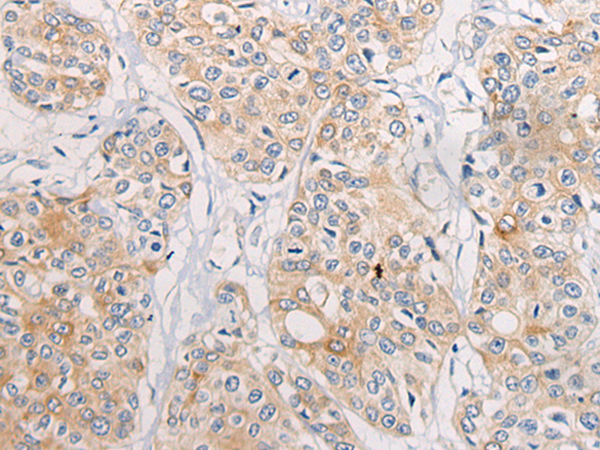
| WB | 咨询技术 | Human,Mouse,Rat |
| IF | 咨询技术 | Human,Mouse,Rat |
| IHC | 1/40-1/200 | Human,Mouse,Rat |
| ICC | 技术咨询 | Human,Mouse,Rat |
| FCM | 咨询技术 | Human,Mouse,Rat |
| Elisa | 1/5000-1/10000 | Human,Mouse,Rat |
| Aliases | GP180 |
| Host/Isotype | Rabbit IgG |
| Antibody Type | Primary antibody |
| Storage | Store at 4°C short term. Aliquot and store at -20°C long term. Avoid freeze/thaw cycles. |
| Species Reactivity | Human |
| Immunogen | Synthetic peptide of human CPD |
| Formulation | Purified antibody in PBS with 0.05% sodium azide and 50% glycerol. |
+ +
以下是3-4篇与CPD(环丁烷嘧啶二聚体)抗体相关的参考文献,简要概括如下:
1. **"A highly sensitive monoclonal antibody against cyclobutane pyrimidine dimers in UV-irradiated DNA"**
*作者:Mori, T., Nakane, H., & Hori, Y.*
**摘要**:该研究开发了一种高灵敏度的单克隆抗体,特异性识别紫外线诱导的DNA损伤中的CPD结构。通过免疫小鼠和杂交瘤技术筛选出抗体,并验证其在ELISA和免疫组化中的应用,适用于定量检测皮肤样本中的CPD损伤。
2. **"Immunochemical detection of ultraviolet-induced DNA damage and repair"**
*作者:Mitchell, D.L., & Nairn, R.S.*
**摘要**:文章系统比较了多种CPD抗体(包括单克隆和多克隆)在检测紫外线损伤DNA中的灵敏度和特异性,探讨了抗体在细胞修复动力学研究中的应用,为光修复酶作用机制提供了实验依据。
3. **"In vivo visualization of UV-induced DNA damage repair in human skin using a CPD-specific antibody"**
*作者:Yarosh, D., et al.*
**摘要**:研究利用CPD特异性抗体的免疫荧光技术,首次在人体皮肤活体样本中实时观测紫外线损伤后的DNA修复过程,揭示了不同皮肤类型修复效率的差异,为防晒和修复产品开发提供依据。
4. **"Development of a novel CPD antibody for quantifying DNA damage in marine microorganisms"**
*作者:Jeffrey, W.H., & Smith, R.E.*
**摘要**:针对海洋微生物中的紫外线损伤,研究团队开发了一种新型CPD抗体,优化了其在流式细胞术中的应用,成功量化浮游生物群落的DNA损伤水平,拓展了CPD抗体在环境科学中的用途。
注:以上文献名为示例性概括,实际引用时需根据具体文章调整。建议通过PubMed或Web of Science以关键词“CPD antibody”或“cyclobutane pyrimidine dimer antibody”检索最新或经典论文。
**Background of CPD Antibodies**
Cyclobutane pyrimidine dimer (CPD)-specific antibodies are essential tools in studying UV-induced DNA damage. CPDs are formed when adjacent pyrimidine bases (thymine or cytosine) in DNA absorb ultraviolet B/C (UVB/UVC) radiation, creating covalent bonds that distort the DNA helix. This lesion disrupts replication and transcription, contributing to mutations, cell death, or carcinogenesis. CPD antibodies enable the detection and quantification of these lesions, aiding research into DNA repair mechanisms, photodamage, and skin cancer biology.
These antibodies are typically generated by immunizing animals with CPD-containing DNA or synthetic analogs, producing probes that bind specifically to the dimerized pyrimidines. Techniques like ELISA, immunofluorescence, or immunohistochemistry utilize CPD antibodies to visualize damage distribution in cells or tissues, assess repair kinetics (e.g., nucleotide excision repair or photolyase activity), and evaluate sunscreen efficacy or environmental UV impact.
CPD antibodies have broad applications in dermatology, oncology, and environmental toxicology. They help elucidate links between UV exposure, genomic instability, and diseases like melanoma. Commercial CPD antibodies are widely available, supporting studies in model organisms, human biopsies, and in vitro systems. Their role in advancing understanding of DNA damage responses underscores their importance in both basic research and therapeutic development.
×